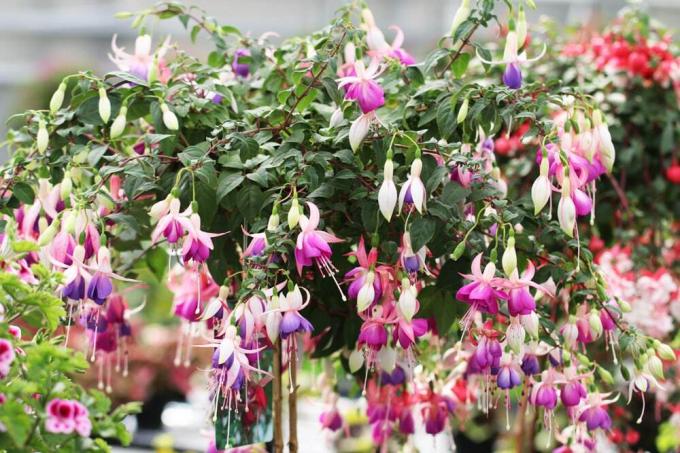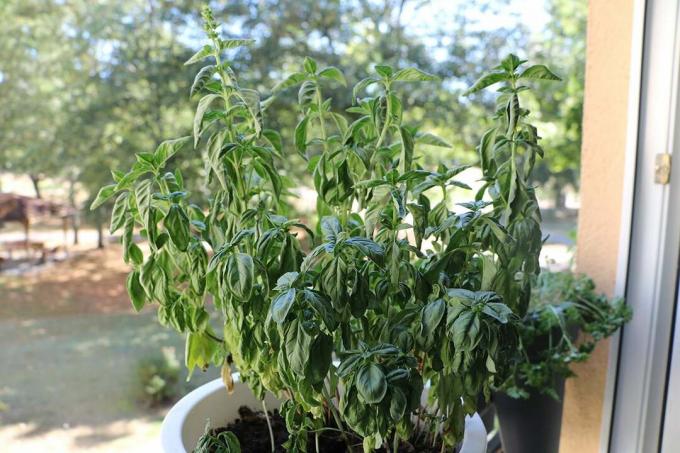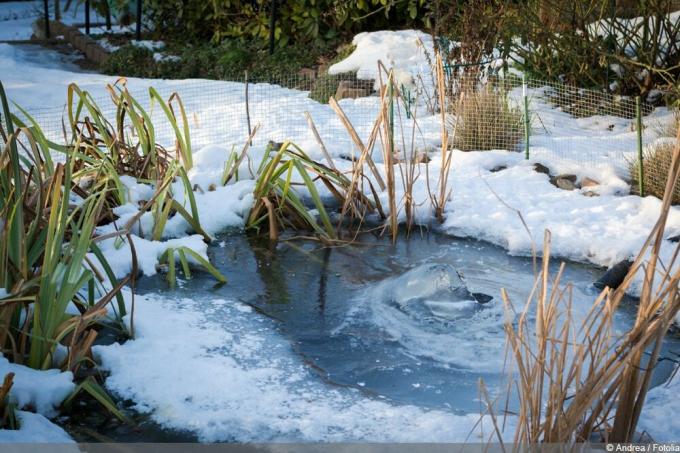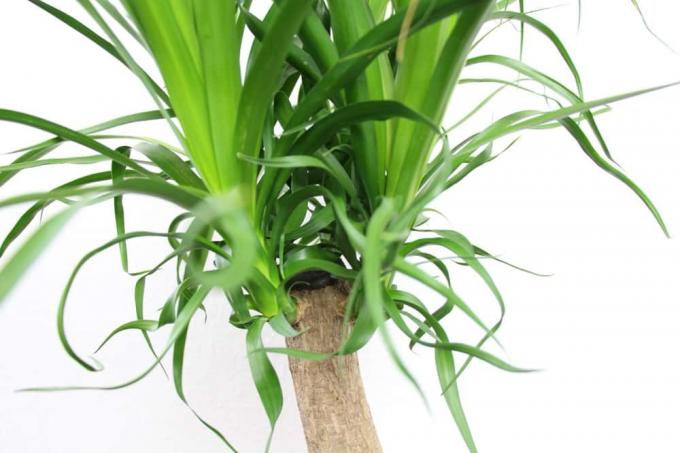

Table of contents
- Proper wintering of balcony flowers
- Which hardy balcony plants for the balcony or terrace
- Pruning and fertilizing in autumn
- Geraniums and petunias overwinter
- Caring for hardy balcony plants properly
- Overwinter balcony flowers properly
- Conclusion
Especially if you don't have a garden, planting on the balcony or terrace is welcome. After work or on warm summer days you can enjoy your balcony flowers and enjoy their smell. Depending on the size of the balcony or terrace, you can arrange your floral splendor. Potted plants but also hanging or climbing plants create a beautiful outdoor ambience. Of course, balcony flowers and balcony plants must be properly cared for. Just watering now and then and a little fertilizer here and there is not enough. Here are a few tips for having a bounty of flowers throughout the summer and maintaining floral splendor throughout the winter.
Proper wintering of balcony flowers
Before you plant your balcony, it should be clear in advance where to put the tubs and pots in winter. There is not always a wind-protected place or winter quarters in the house. Hardy balcony plants are the right alternative here. Apart from the fact that there is no space problem in winter, the balcony or terrace still looks beautiful in winter. But that doesn't mean that hardy plants like Siberian cold, they also have special requirements for their winter quarters. Proper hibernation begins with a coconut mat or fleece or styrofoam under the tubs, wooden panels also do their best. Like all plants that remain outside in winter, balcony plants and balcony flowers must also be watered, but avoid waterlogging. A cover made of fleece or bubble wrap is there to give off heat.
From time to time you should take a look at the plants, so that a pest infestation can be discovered in winter and possibly removed. treat. A temperature of 5-10 °C is recommended for exotic potted plants. The plants need a low temperature to shut down their metabolism. If the temperatures are too high, the plants sprout and long and thin shoots form. A conservatory would be the ideal place to spend the winter, but also a bright and cool basement. Staircases and a bright garage are also ideal. The angel's trumpet and the fuchsias can hibernate in completely dark rooms if the temperatures are low. But not only potted plants can be overwintered, but also flowers, such as the dahlia, for example. Here the tubers are stored in the dark room. The daisy bush also overwinters at 5 to 50 degrees in a bright room.
Which hardy balcony plants for the balcony or terrace
Plants that will come back next season have their place on the balcony. Clematis, for example, needs more protection around its roots than other balcony flowers. Wrapping with fleece and accumulation of fir branches is ideal. Likewise, rose stems are sensitive and require a reinforced casing. Boxwood or firethorn, but also the cotoneaster with its bright red berries transform the winter outdoor area into a beautiful environment. Small firs or dwarf conifers are z. B. made for festive lighting. But these plants also need winter support. The buckets should be pushed against the house wall and the upper area covered with leaves or fir branches. The weather side, i.e. the west side, is not so optimal, as there is icy frost here. But the location should be light, because the darker the plant is, the cooler it is. Do not forget to water on frost-free days, otherwise the plants will not freeze but die of thirst. Wrapping the buckets with jute bags creates an attractive look, especially when a rustic bow is wrapped around them.
Pruning and fertilizing in autumn
All plants have requirements during their vegetation phase, which should also be met in the winter quarters. As with the plants in the garden, autumn is the right time to cut back the plants. When pruning, one should have the right tool and the weather should be appropriate. This should be cut back on warmer and dry days, as the wounds caused by cutting heal faster.

Diseases cannot spread so quickly. Disease infestation on the plants should be checked carefully after pruning, because only healthy plants survive the winter outside. Even if the plants are overwintered indoors, you should look for diseases, otherwise the other overwinterings can also be affected, which means buying new ones in spring. August but no later than the beginning of September should be the last date for the last fertilization. During the winter, the plant is resting. The next fertilization should only take place after four months.
Geraniums and petunias overwinter
The petunia, a popular balcony plant, enchants with its funnel-shaped flowers. It usually ends up on the compost at the end of its flowering period. But you can also bring them over the winter. There are two ways, one of which is the seed. You wait until the flower is brown and then remove the shell and then you can remove the seed pod. When the flower has dried a bit, you can crush it with your fingers and it will contain the seed. This is dried and sown again in the spring. You can also overwinter the whole petunia with its flower. The flowering shoots should be shortened here, otherwise they will lose too much strength. Again, moderate watering applies here, otherwise the petunia roots can rot. The room in which it hibernates should be bright and cool.
The geranium can also be overwintered under the same conditions as the petunia.
Caring for hardy balcony plants properly
Even plants that are actually hardy need winter protection if they are cultivated in a bucket or in boxes on the balcony. Their roots are much more exposed to the cold than the plants in the garden, so the planters should be wrapped in an insulating material such as fleece or bubble wrap.
Problems often arise because the planters are exposed to the sun during the day. Then the root ball warms up and freezes again during the night. This constant change is often very difficult for the plants, so it makes sense to use pots that are as light as possible for the winter and don't heat up so much. Alternatively, the planters can also be placed in such a way that they are not exposed to direct sunlight.
Evergreen plants also evaporate water through their leaves in winter and therefore need to be watered all year round. However, it is important to ensure that you only water on frost-free days so that the roots are not damaged by the freezing water. Plants with long leaves like pampas grass or bamboo often have problems with moisture in winter. They can be protected by loosely tying their leaves together. A location near the wall of the house is recommended for these plants, where they do not get constantly wet in rain and snow.
Overwinter balcony flowers properly
Many balcony flowers can be overwintered with relatively little effort in order to save the money for buying new ones next spring. This often happens with the popular balcony flowers such as geraniums, fuchsias and bulb flowers, but many other plants can also be overwintered. Basically, when overwintering, all plants that shed their leaves in autumn can stand in a dark place such as the basement for the winter months. Evergreen plants that are not hardy, on the other hand, need light for photosynthesis all year round and should therefore be housed in a bright room.
Most balcony flowers should be in a cool room for the winter. The stairwell or a room that is rarely used and therefore not heated is best suited for this, unless a special cold building or similar is available. Onion flowers need drought and good ventilation in winter. They should be turned occasionally to prevent moisture from collecting under the onions, which would cause the onions to rot. So that they start to bloom again early, they can be grown in a pot on the windowsill from the beginning of the year.
A safe time to bring the balcony plants outside again after the winter is after the ice saints in mid-May, because then there is no longer any risk of late frosts. However, they can also be brought back into the house overnight in pots and tubs if they need to be out on the balcony earlier.
Conclusion
Before you buy balcony flowers and balcony plants, you should think about whether there is enough space to overwinter the plants in the house if necessary. If this is not the case, hardy plants should be selected. These can remain outdoors with the appropriate precautions.
 garden editorial
garden editorial I write about everything that interests me in my garden.
Learn more about overwintering plants

How much frost do horned violets tolerate?
Horned violets are a popular bedding plant that survives the winter. They are planted either in spring or in autumn and overwinter in the beds. They usually do without frost protection, which is why they are also often used as easy-care plants for graves.

Is the dragon tree hardy? 7 tips for wintering
Dracaena, the botanical name of the dragon tree, is not just coincidentally reminiscent of a palm tree. Like the palm trees, it also likes it warm and sunny. He is not hardy and has to hibernate in the house. Here are some tips.

Are asters hardy? 5 tips for wintering
The summer aster and the autumn aster not only differ in their flowering time. When winter arrives, another difference becomes apparent: one dies, the other survives the frost.

Overwintering basil: 7 tips for caring for it in winter
If you want to enjoy fresh basil in winter, you can overwinter it with a little skill. With these 7 tips you will definitely succeed!

Overwintering pond plants | Aquatic plants in winter
The garden pond is an important design element in the garden for many hobby gardeners. With the right pond plants, it draws everyone's attention. The numerous species differ in their appearance, their planting location on or in the pond and, last but not least, their winter hardiness.

Overwintering Yucca Palm - Is It Hardy?
Although yucca palms are indoor plants, they like to be outdoors in the summer. However, most species are not hardy. It is necessary to winter them indoors. You can find out how to do this here.



